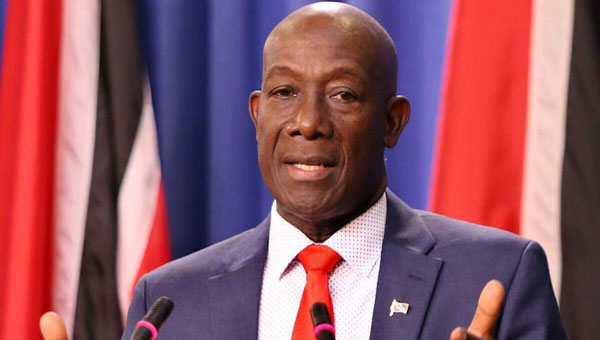PORT OF SPAIN, Trinidad and Tobago, February 4, 2020 (CMC) – Prime Minister, Dr. Keith Rowley, confirmed, yesterday, that the Unitization Agreement, for the exploitation and development of hydrocarbon reservoirs of the Loran-Manatee Field, has been suspended, because of the ongoing sanctions by the United States on the Venezuela government.
“It is regrettable that we cannot move ahead with the Dragon Project, which is on hold, at this time, due to US sanctions on Venezuela. At a moment’s notice, we are ready to move ahead with the project, on the lifting of such restrictions, since virtually all the preparatory work has been done,” Rowley told a conference on energy, organised by the Energy Chamber of Trinidad and Tobago.
He related that, notwithstanding the development, “we are proceeding with the Manatee initiative, which is the single most significant development in the energy sector in recent times”.
The US government has imposed sanctions on the Maduro government, as it seeks to remove the Head of State from office, in favour of Opposition Leader, Juan Guaido, claiming that the last presidential election was not free and fair.
While Washington has the support of a number of Western countries, Caracas has the support of Russia, China and Cuba. Caribbean community (CARICOM) countries have adopted a policy of non-interference and non-intervention in the internal affairs of the South American country.
Rowley told the conference gas production is projected to come on-stream from Manatee field, which forms a part of the Loran-Manatee cross-border field and is located in the marine area of Trinidad and Tobago. He described the Loran-Manatee as a shallow-water field that straddles the maritime boundary, between Trinidad and Tobago and Venezuela.
He said exploration activity, initially by state-owned Petroleos de Venezuela (PDVSA) and later by US Corporation, Chevron, which held a 60 percent interest, encountered a substantial amount of gas in the Loran field.
Rowley said, in 2007, the two governments executed a Framework Treaty, relating to the unitization of hydrocarbon reservoirs that extend across the delimitation line, between the countries, and that the treaty established the general framework, under which any cross-border reservoir would be exploited.
He said in 2010, the two countries exchanged instruments of ratification, in respect of the Framework Treaty, which action officially brought the treaty into force.
But he said progress in the development of the unitised Loran-Manatee field has been impeded by the sanctions imposed by Washington, which inhibits US companies from doing business with Venezuelan Oil Company, PDVSA.
“This impacts on the ability of US company, Chevron, which has a 60 percent interest in the Loran field, to participate in the development of the Loran-Manatee Field. As a consequence, the government of the Republic of Trinidad and Tobago and the Bolivarian government of Venezuela have agreed to the independent development by each government of the field within the Loran-Manatee cross-border that falls within its marine area,” Rowley explained.
He said pursuant to this decision, the two governments rescinded the Unitization Agreement for the exploitation and development of hydrocarbon reservoirs of the Loran-Manatee Field that has an estimated resource of 10.04 tcf, with 2.712 tcf within the Manatee field.
Rowley said Shell Trinidad and Tobago Limited holds 100 percent interest in the Manatee field and has projected that gas production could start in the 2024/2025 period, at rates ranging from 270 to 400 million standard cubic feet per day.
“Shell is in conversation with the government and is working on various development scenarios, to determine the best option. This major policy shift, which frees up investment and development of Manatee gas, also provides easy access to market for all gas from these fields, if the circumstances permit and the owners so desire.”
Rowley described the Loran-Manatee Field as a landmark decision in the countries’ cross-border relationship, saying this has implications for development of other cross-border fields, such as the Manakin-Cocuina and the Kapok-Dorado, which, collectively, have an estimated 850 billion cubic feet of natural gas, within the Trinidad and Tobago maritime area.
“The achievement of this agreement is a reflection of positive initiatives, being undertaken by government, to meet domestic gas requirements for competitive energy and our retention of a place in the petrochemical and LNG business, for some considerable time to come.”
He said the domestic energy sector is due for a, in excess of 90,000 barrels a day by 2022.
The production is driven by developmental drilling activity, work-overs and enhanced oil recovery projects, undertaken by Heritage, its resumption of offshore exploration, new oil from Rio Claro and Ortoire Blocks and significantly BHP Ruby Delaware field in block 3a, Rowley told the conference.
 Pride News Canada's Leader In African Canadian & Caribbean News, Views & Lifestyle
Pride News Canada's Leader In African Canadian & Caribbean News, Views & Lifestyle





